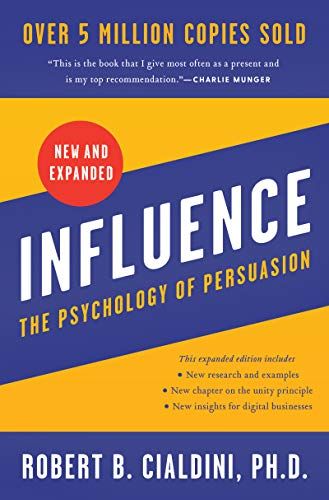Psychology and marketing professor Robert Cialdini, PhD offers a fundamental primer on the mental shortcuts that drive many of your decisions.

Shortcuts Guide Your Life
Robert Cialdini, PhD – bestselling author and the Regents’ professor emeritus of psychology and marketing at Arizona State University – explains that people use shortcuts when they make decisions, signals that help them respond to situations.
These shortcuts improve the efficiency of your decision-making, but other people can use them to lead you to choices that may be detrimental to you. Cialdini describes seven decision-making shortcuts, explains how they serve you and how you can defend yourself against them. Whether you are the influencer or the influenced – and everyone at different times is one or the other – his insights will prove practical and helpful.
More than 5,000,000 buyers of this book agree on its efficacy, hence this new, expanded and revised edition. In this bestseller and perennial college text, Cialdini willfully simplifies and explains these complex principles. The result is a rare mainstream this-is-why-you-do-what-you-do text that provides useful insight into your habits and choices.
Seven principles
Cialdini maintains that people have built-in behavioral programs that respond to specific stimuli. His work to codify these responses generated seven principles that he finds guide human behavior: reciprocation, liking, social proof, authority, scarcity, commitment and consistency, and unity.
These principles or heuristics help you make efficient decisions. However, the author warns, influencers also can exploit these principles to sway you to buy or believe something. As your information overload increases, so does the degree to which you rely on decision shortcuts.
Reciprocation
Giving something to someone makes that person want to give you something in return. When someone concedes to you, you feel an obligation to concede in response, for example, in salary negotiations.
The rule says that favors are to be met with favors; it does not require that tricks be met with favors.Robert B. Cialdini
Salespeople utilize this principle by offering you something to reject before offering you what they really want to sell.
Liking
People whom you like have the most influence over you – and they affect you more readily than other people can.
Cialdini’s list of factors that lead you to like someone seems tragically obvious: physical attractiveness, dressing like you, sharing interests and language, and mutual associations with pleasant things. You also like people who compliment and praise you in positive situations.
We automatically assign to good-looking individuals such favorable traits as talent, kindness, honesty, agreeableness, trust-worthiness and intelligence. Robert B. Cialdini
Raise a red flag if you unduly like someone. If someone makes an effort to influence you, ask if your positive feelings about that person make sense.
Social Proof
To make decisions, people observe what others have done in similar circumstances. Social proof, Cialdini notes, is why coffee servers seed their tip jar with a couple of dollars and why you read online product reviews.
The principle of social proof works best when the proof is provided by the actions of many other people. Robert B. Cialdini
Uncertainty, large numbers and a sense of similarity strengthen social proof. If many people do something, others will do the same. Someone else’s choice validates your decision and suggests that the activity you’re considering is socially acceptable. Similarity works pretty much the same way.
Dependence on social proof causes problems when everyone waits for someone else to act. Be alert for dishonest social proof – for example, fake online reviews.
Authority
Titles, clothing and trappings make someone seem authoritative. Nice clothes, jewelry and cars signal affluence and position. Cialdini asserts that people think those trappings have less influence than they really do.
Information from a recognized authority can provide…a valuable shortcut for deciding how to act in a situation. Robert B. Cialdini
“Credible authority” is a combination of trustworthiness and expertise. Cialdini believes following authority is often the right choice. However – as if he’s writing about today’s political arena – he cautions you to consider if any so-called expert has a motive to deceive you.
Scarcity
People dread losing something more than they value gaining something. Because rare things often are more valuable, scarcity provides a shortcut clue to value.To attract others, for example, emphasize the scarce traits that make you unique.
When something becomes less available, our freedom to have it is limited, and we experience an increased desire for it.Robert B. Cialdini
Scarcity applies to information as well as things, so censored messages or messages with scarce information prove more effective.Be alert to any sense of scarcity and monitor your possible reactive responses.
Commitment and Consistency
Making a choice strengthens your belief that it is a good one. When people commit to something, they tailor their future decisions and behaviors to be consistent with that commitment. Commitment and consistency enable people to think less about their decisions; they do what they did before.
Commitments also prove effective when people volunteer to accept them, take the initiative, make pledges in public or put in some effort to fulfill a promise. Once people make a commitment, they rationalize it, and that grants it durability.
People often add new reasons to support the wisdom of commitments they have already made.Robert B. Cialdini
Heed your gut when it tells you a commitment you’re considering would be foolish.
Unity
When people identify someone as a member of their in-group, they work for that group member’s well-being more than they would work for the well-being of someone who is not a member. They use members’ behaviors and preferences to guide their own, and therefore become more defensive and forgiving of that person than of others. Unity preferences benefit your group and, thus, yourself.
Deception that strengthens a ‘we’-group is viewed by members as morally superior to truth-telling that weakens their group. Robert B. Cialdini
In-group identifiers include ethnicity, political affiliation, race and sports team affiliations. National loyalty, shared enemies, shared emotions and shared perspectives als0 create unity. This unity isn’t enduring, but repeated attention reinforces it.
Making decisions based on partial information using these seven shortcuts exposes you to exploitation. Call out and boycott those who use these triggers manipulatively.
Foundational psychology
To determine his seven principles, Cialdini applied 35 years of peer-reviewed research and a three-year field study of people’s motives for change. As you read through these tenets, however, you may think that any really in-depth discussion over a dinner table might reach the same conclusions. Writing for a mass audience, Cialdini offers a primer, a foundational introduction to psychological processes that laypeople and students might find revelatory. And if you already know and understand these principles, Cialdini’s articulate overview may bring you new insights.
Robert Cialdini, PhD, also wrote the New York Times bestsellers Pre-Suasion: A Revolutionary Way to Influence and Persuade and Influence, New and Expanded: The Psychology of Persuasion. Parallel approaches to applicable psychology include The 48 Laws of Power by Robert Greene and To Sell Is Human: The Surprising Truth About Moving Others by Daniel H. Pink.














